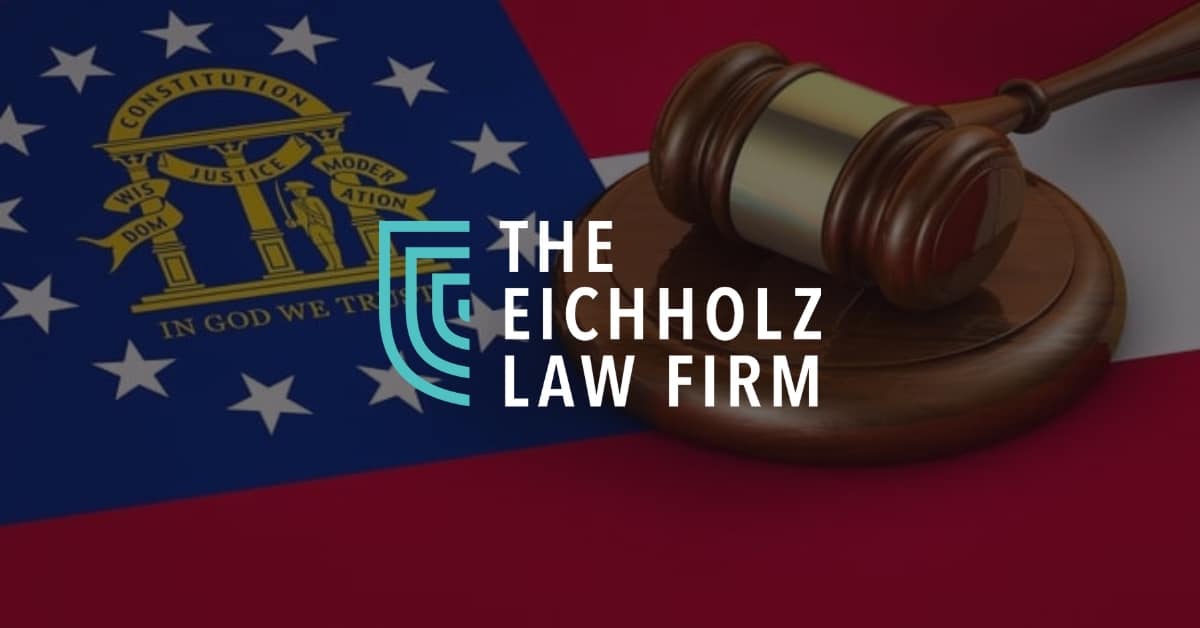Do you plan on filing a personal injury lawsuit in Georgia due to a negligent incident caused by someone else’s intentional or reckless behavior? In that case, you need to make sure that you understand the statute of limitations for these types of cases.
The following article contains more details on Georgia’s filing deadlines, including why these deadlines are essential and when the time limit could be extended. For professional help filing a personal injury lawsuit within Georgia’s statute of limitations, contact The Eichholz Law Firm. Our attorneys have years of experience handling cases in Georgia, and we can help you determine what laws apply to your specific situation.
Georgia’s Time Limit for Filing Personal Injury Lawsuits
Injured victims have two years from the date of the accident to file a personal injury lawsuit for any injuries a person sustained, according to Georgia Code section 9-3-33. This statute of limitations applies to most kinds of personal injury cases, whether they are based on intentional tort (the injury was a result of the defendant’s purposeful actions) or negligence (the defendant’s careless actions were a direct cause of the accident).
Statutes of limitations in Georgia’s court system determine the amount of time a plaintiff has to file a claim. While some personal injury victims may feel rushed by these statutes, the deadlines ensure that these timely legal actions help the plaintiff and the defendant. Plaintiffs can gain access to new evidence that will support them prove their cases, and defendants won’t have a legal lawsuit hanging over their heads for an indefinite period of time.
The filing deadlines surrounding Georgia’s statute of limitations are quite strict. A victim’s case may be dismissed, and they could forfeit their right to seek legal compensation for their losses if they file their claim after the statute of limitations has expired.
What to Do If You Have Missed the Deadline
The court will dismiss your case if the defendant points out that you (the plaintiff) filed your personal injury lawsuit more than two years after the accident occurred. Should that happen, you can no longer seek compensation for your injuries, no matter how severe they are, even if the defendant is partially or entirely to blame for what happened. There are rare exceptions where a victim may be entitled to an extension of Georgia’s statute of limitations. The next section will explain these exceptions in further detail.
Victims need to take into consideration if they have missed the filing deadline. Georgia’s statute of limitations regarding personal injury claims is not a factor of merely deciding to take your case to court by filing a lawsuit. Your position in settlement negotiations with the defendant and their insurance company is crucial through the filing deadline set by this law. You won’t have any leverage left if you file your case after the two-year statute of limitations period has passed.
Exceptions to Georgia’s Statute of Limitations
The statute of limitations isn’t negotiable in most cases. A “toll,” or pause, is one notable exception, according to Georgia code sections 9-3-94 and 9-3-90.
The following situations can put personal injury statutes of limitation on hold:
The victim was a child. If the injured individual was a minor when they became injured, the statute of limitations doesn’t begin until their 18th birthday.
- If the defendant moves from Georgia to another state after the plaintiff becomes injured in an accident, but before the plaintiff was able to file a lawsuit and serve the defendant successfully with the required documentation, the defendant’s leave of absence won’t be counted as part of the statute of limitations. Once the defendant has moved back to Georgia, the clock will resume.
- The victim is considered mentally incompetent. If the victim has been deemed mentally incompetent by a doctor, the statute of limitations won’t begin until their competency has been regained.
- If a minor under the age of five had gotten injured in a medical malpractice case, the statute of limitations would remain in effect until the child turns seven years old.
- A traffic ticket was involved in the case. Traffic citations, including failure to yield, running a red light, or speeding, can offer a plaintiff a wealth of evidence in a personal injury lawsuit. A citation can also extend Georgia’s statute of limitations, as it can toll the law until it has been resolved.
- Not enough opportunity was given for reasonable discovery. The statute of limitations could be extended if the medical condition or injury could not be discovered reasonably within a specified time frame.
Georgia’s Discovery Rule
The discovery rule in a typical personal injury lawsuit doesn’t apply. According to this rule, the statute of limitations clock won’t start running until after the person discovers the injury. In Georgia, the statute of limitations clock runs as soon as the injury occurs, regardless of whether you knew you were injured or not. For instance, if you sustained a hairline fracture in an accident, but did not find out about it until a month after the incident, the statute of limitations has already been in motion for over a month. There are only certain circumstances where a discovery exemption could impact the statute of limitations. If you believe a discovery exemption may apply to your situation, you should contact our legal team right away to be sure.
It is important to note that, depending on the type of accident that occurred, there is an ultimate deadline, even if you believe your case qualifies for an extension of the Georgia statute of limitations. The statute of repose is five years for a medical malpractice claim, six years for a car accident claim, and ten years for a product liability claim.
Contact A Qualified Personal Injury Attorney
The statute of limitations for Georgia personal injury lawsuits must be observed when filing a claim. If you or someone you love was involved in a personal injury accident, you should speak with The Eichholz Law Firm to discuss your options for taking legal action. Our attorneys can help you file a lawsuit within Georgia’s statute of limitations and determine if your case is eligible for any extensions.

